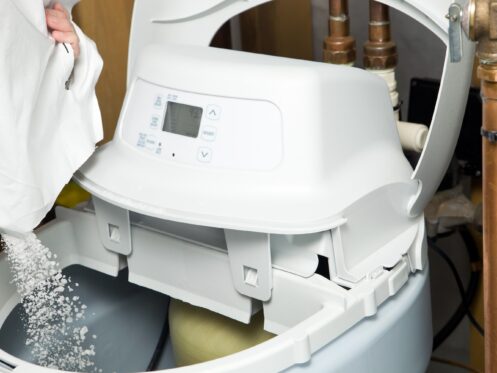Water contains minerals like calcium and magnesium. You can measure that mineral content in milligrams per liter (mg/L). Above 75 mg/L, your home has moderately hard water. At 151 or 300 mg/L, you have hard water or very hard water, respectively. Hard water can cause many problems that can cost the average household hundreds of dollars annually. That’s why the U.S. Department of Energy (DOE) recommends a whole-house water softener as a good investment for practically any home.
The typical residential system works by exchanging the magnesium and calcium with salt. Let’s explore the many benefits of this approach.
1. Providing Better Water for Drinking and Cooking
Hard water isn’t necessarily bad for you, as people need minerals in their drinking water for a healthy balance. That said, high mineral content tends to make drinking water more alkaline. Many people dislike high-pH water because it’s chalky in texture and leaves behind a film. In addition, hard water affects your dental health. That’s because the hardness can combine with plaque to form tartar more easily. Hard water changes the aroma and taste of alcoholic and nonalcoholic mixed drinks because there’s a chemical reaction. It can also negatively affect the taste of food. You may find that your recipes are much more consistent when cooking with softer water.
2. Enhancing Shower Experiences and Improving Skin and Hair Health
Softer water provides for better shower experiences, as the minerals build up as a sheen on your skin and can clog your pores. The buildup makes many people feel they can’t get as clean as they would like. Hard water makes soap, shower gels, shampoos, and conditioners less effective. These are all reasons why showerheads with integrated water-softening filters have become so popular. Hard water lends itself to bad hair days, as it leads to dryness and a flat appearance. The minerals also make you more prone to hair breakage and dandruff. Clogged pores can be much more than an inconvenience. They can cause skin irritation, including razor burn. Hard water can also lead to acne and worsen dermatitis and eczema.
3. Maintaining Optimal Water Pressure
One of the biggest issues with hard water is limescale. Heated water and standing water cause calcium and magnesium to precipitate from the water. Water gets its magnesium and calcium from dissolved limestone in the earth. When the precipitation occurs, it forms limescale. That scale isn’t problematic at first, but the accumulation becomes significant over time. It builds up on the walls of your pipes, and each layer makes the diameter of a pipe smaller. That increases pressure within the pipe but decreases pressure from your fixtures.
4. Lowering Plumbing Maintenance Costs
One reason the DOE recommends water softeners for most homes is they typically pay for themselves over time. One way they do that is by lowering plumbing maintenance costs. Hard water causes pipes and valves to fail sooner than they otherwise would. Homes with a water softener are also less prone to clogs and many other common plumbing issues.
5. Reducing the Risk of Mold, Mildew, and Bacterial Growth
Hard water doesn’t directly cause bacteria, mildew, or mold. Yet, if there’s the potential for those problems, it can accelerate and expand them. The minerals can lead to bacterial growth in your drinking water and around faucets and drains. You can experience mold and mildew for similar reasons. Mold needs a food source, and limescale is an excellent one. Note that mold can form in the water softener itself. That’s why it’s so important to have a plumber clean and service your equipment once a year.
6. Boosting the Water Heater’s Efficiency and Extending Its Life
As mentioned, heating water causes limescale accumulation. In traditional HVAC systems, it can undermine the tank, thermostat, heating element, and other components. That’s why tank systems require annual flushing and checking of the anode rod, along with replacement as necessary. Tankless systems are even more susceptible to limescale and require annual or more frequent descaling. Limescale reduces efficiency and causes your operating costs to rise. It also leads to component wear that can shorten a system’s lifespan by as much as 50%. With a water softener, you can expect a much longer system life.
7. Improving the Hydronic Heating System’s Efficiency and Lengthening Its Lifespan
There are similar concerns for homes that have hydronic heating, including both hot water and steam boilers. Limescale can also affect baseboard radiators, wall radiators, and floor panels. Maintenance and repair costs will be lower over the life of the system with a water softener. You can also expect a longer system lifespan. With softer water and routine maintenance, boilers can last 15 years or more. With hard water, they often fail before the 10-year mark.
8. Providing Higher Efficiency and Longer Life for Other Appliances and Fixtures
Hard water affects all the fixtures and water-using appliances in your home. It causes appliances to use more electricity, fuel, and water. Water hardness can also dramatically shorten fixture and appliance lifespan and increase your total costs. The Water Quality Association, a U.S.-based trade association, performed one of the longest and most robust studies to discover how hard water affects home appliances. It found that water heaters and boilers can lose as much as half their expected life. Washing machines lost over four years of life on average. Dishwashers lost three. Faucet life expectancy fell from nine years to just over five, and toilets lost over four years of life.
9. Allowing for Efficient and Effective Cleaning of Dishes and Laundry
Earlier, we mentioned that hard water makes bathroom soaps less effective. This is true of the detergents you use in the kitchen and laundry room as well. That’s because it prevents the detergent and water from mixing well. It creates soap scum and limits detergents’ abilities to remove oils and residue. These problems make you use more detergent to achieve the same effect. The DOE cites savings on detergents as a key reason for its recommendation. With soft water, you won’t get spots on your glassware. You’ll also find that your laundry is softer and retains its vibrant colors through more washings.
10. Promoting a Streak-Free Finish When You Wash Your Car
Hard water can leave streaks on an automobile no matter how hard you work to avoid them. They are unsightly but can also damage the paint over time. With softer water, you’ll enjoy peace of mind and a much easier time making your vehicle look pristine.
Whole-House Water Softener
Childers Air Plumbing & Electric has been serving homeowners and businesses throughout Beckley, WV and the surrounding areas for over 70 years. In addition to water softeners, we install and service electric and gas furnaces, hydronic heating systems, heat pumps, air conditioners, and ductless mini-splits. You can count on us for thermostats, ductwork, ventilation systems, air purifiers, UV lamps, and humidity control. Our electricians perform rewiring and install and repair electrical panels, surge protection, generators, outlets, and switches. We have a top-notch plumbing team that can handle it all, from drain cleaning and trenchless sewer repair to kitchen and bathroom fixtures, water heaters, water filters, water softeners, and sump pumps.
Call Childers Air Plumbing & Electric today or contact us online to set up an appointment.

